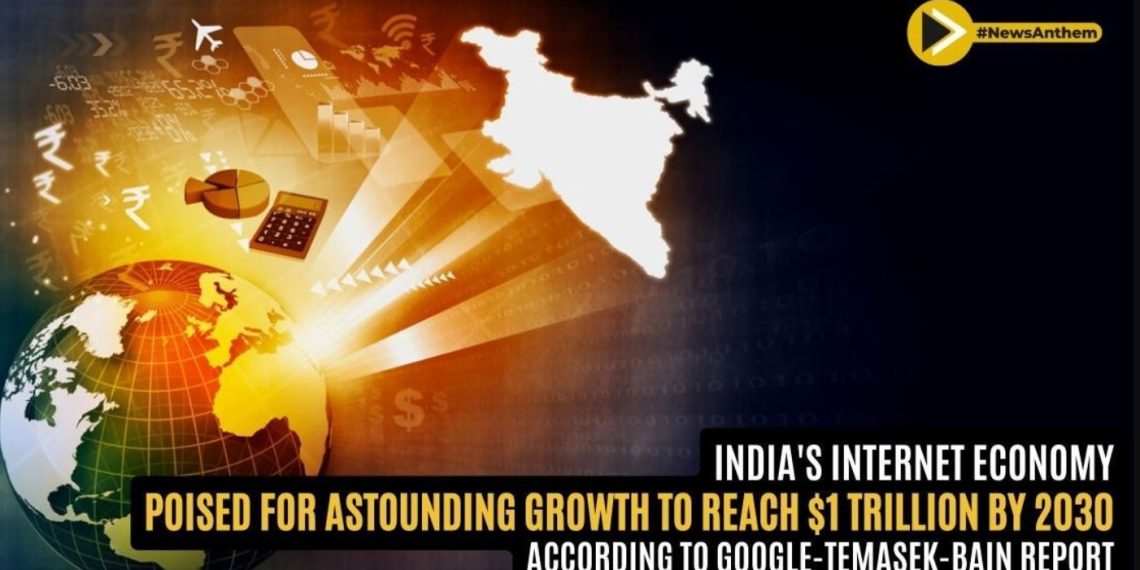A comprehensive report released by Google, Temasek, and Bain & Company has unveiled remarkable projections for India’s internet economy, foreseeing its value skyrocketing to $1 trillion by 2030 from the current $175 billion in 2022. The report, titled ‘The e-Conomy of a Billion Connected Indians,’ underscores the profound influence of evolving consumer behavior and the expansion of the business ecosystem on India’s internet economy.
Key Sectors Driving the Growth
The study delves into the crucial sectors propelling the Internet economy, including e-commerce, online travel, food delivery, ride-hailing, and digital financial services. It highlights three pivotal factors that are expected to catalyze the growth of the internet economy: increasing digital adoption in Tier 2+ locations, the digitization of traditional businesses, and the success of India’s digital public goods or ‘India Stack.’
Embracing a Transformative Opportunity
Sanjay Gupta, the country head of Google India, expressed enthusiasm about the immense potential this transformation holds: “Structural shifts in consumption potential are opening up a vast opportunity for startups, large businesses, and MSMEs to power India’s internet economy towards a projected growth of 6x, reaching a trillion dollars by 2030. We’re pleased to join Bain and Temasek in this first-of-its-kind multidimensional view of the digital landscape and are confident and committed to partnering with India in this extraordinary opportunity.”
The Role of B2C E-commerce
The internet economy sectors are already experiencing positive growth, with B2C e-commerce emerging as a major contributor, accounting for approximately one-third of the overall value. This surge is primarily driven by increased usage in smaller towns and cities. Currently, B2C e-commerce boasts a Gross Merchandise Value (GMV) of $65 billion, and it is poised to expand six-fold, reaching an impressive $380 billion by 2030.
Online Travel, Food Delivery, and Ride-Hailing on the Rise
In addition to e-commerce, other sectors such as online travel, food delivery, and ride-hailing are also expected to witness significant growth. The rapid adoption of digital platforms for travel bookings, food ordering, and transportation services has revolutionized the way Indians access and experience these services. The report projects these sectors to follow a similar growth trajectory, with a high probability of scaling four to five times over the next decade.
Digital Financial Services: A Booming Sector
The widespread acceptance of digital tools and solutions by both consumers and merchants is fueling the growth of digital financial services. This sector, encompassing areas such as payments, lending, investments, and insurance, is anticipated to exhibit a Compound Annual Growth Rate (CAGR) of 8% to 13% from 2022 to 2030. As more Indians embrace digital transactions and financial inclusion initiatives gain traction, this sector is poised to play a pivotal role in India’s internet economy.
Enabling Factors and Potential Challenges
The report identifies several enabling factors that will contribute to the growth of India’s Internet economy. These include increasing smartphone penetration, affordable internet access, rising digital literacy, and the government’s efforts to promote digital infrastructure and innovation. However, the report also acknowledges potential challenges such as addressing the digital divide, ensuring data privacy and security, and fostering a conducive regulatory environment that promotes innovation while protecting consumers’ interests.
With such promising prospects on the horizon, India’s internet economy is set to become a major powerhouse, driving innovation, economic development, and digital transformation across the country. The projected growth to $1 trillion by 2030 reflects the immense potential of India’s digital landscape and presents a tremendous opportunity for businesses, startups, and entrepreneurs to thrive in this dynamic ecosystem. As the internet economy continues to evolve and shape the future of India’s economy, stakeholders must collaborate to overcome challenges and leverage the power of connectivity to build a prosperous and inclusive digital future for all.


































































































































































































